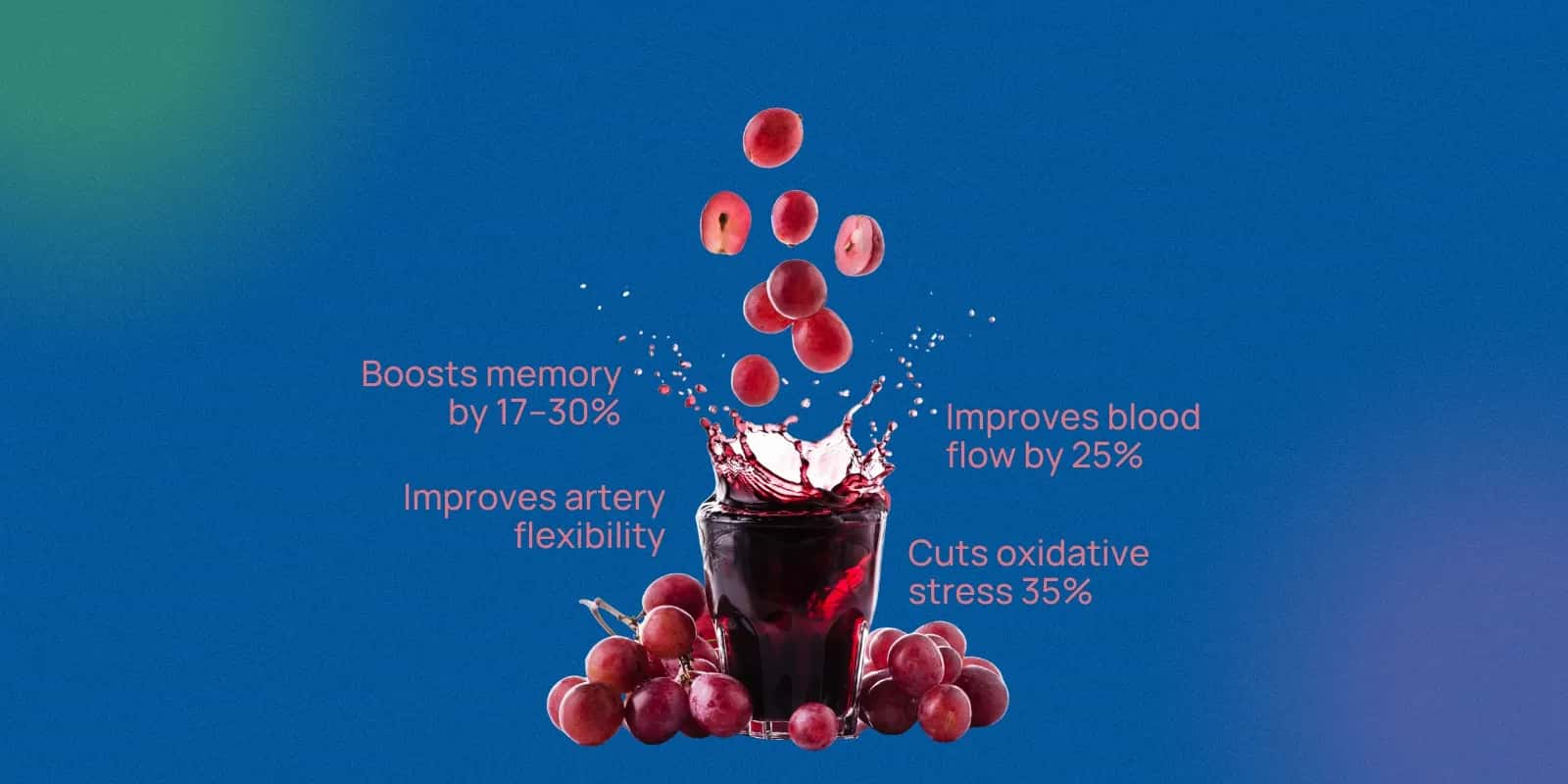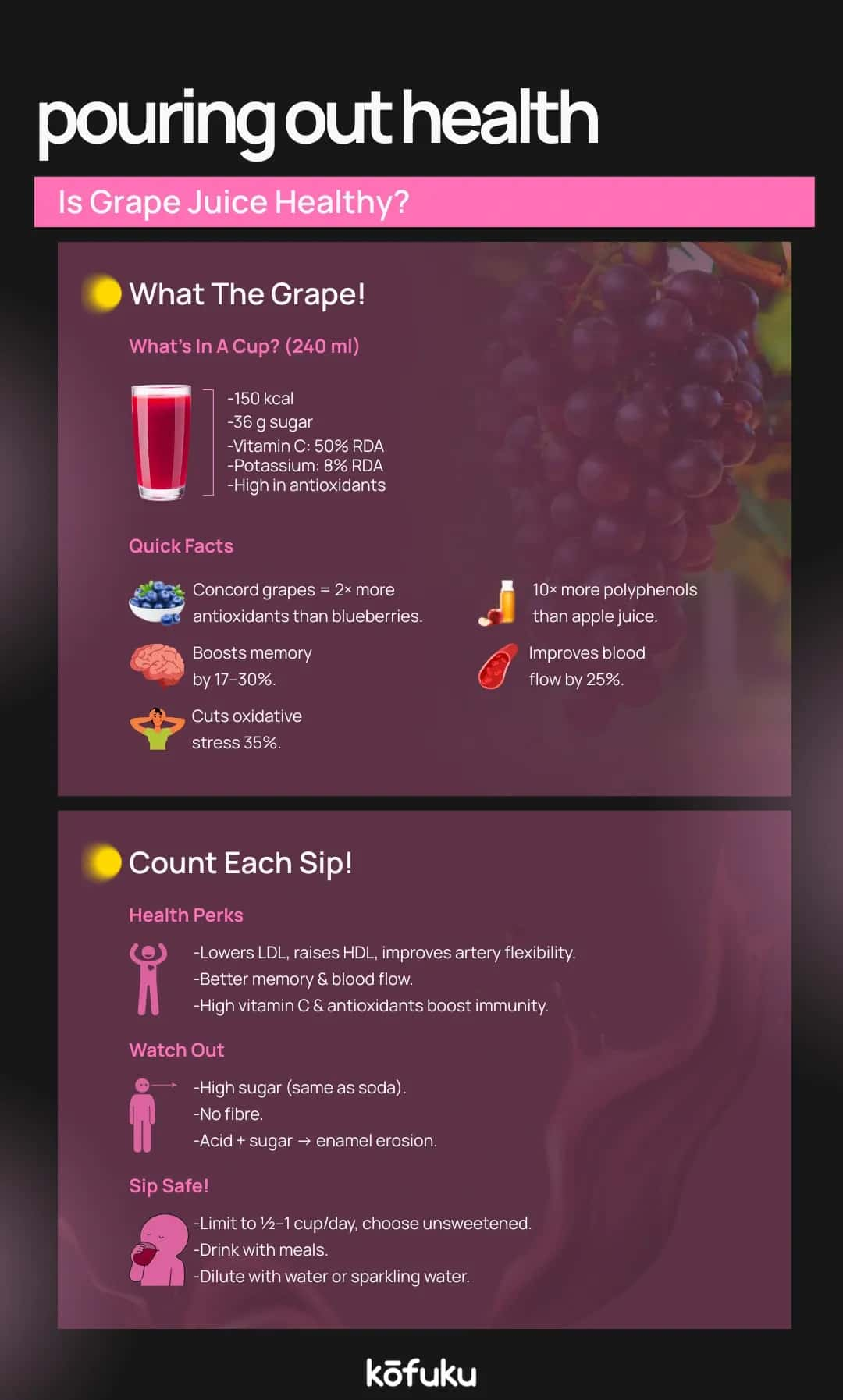Is Grape Juice Really Healthy? Here’s What You Need to Know

Introduction
Most of us enjoy wine after a long, tedious work week, but how much do we know about its base foundation, the grape juice? In fact, plain old grape juice isn't as popular as fermented grape juice.
While an occasional glass of wine can be good for your cardiovascular health and blood pressure, regular grape juice has plenty to offer, too. And the good part? You can drink it more frequently than wine.
Grapes, often called the queen of fruits, are popular in their entirety and are good not only for our taste buds but also for our health in multiple ways.
These are the powerhouse of antioxidants, vitamins and minerals; no wonder people love snacking on grapes and adding them to vegetables and salads. But let's talk about grape juice - is it truly good for your health?
In this guide, we will help you understand the advantages of grape juice, the nutritional value of black grapes, the calories in grapes, the sugar content in grapes and many more things.
Why People Consider Grape Juice a Healthy Choice
One of the reasons why many prefer consuming grape juice is that it is rich in antioxidants that help maintain heart health and enhance immunity. With regular consumption, grape juice not only boosts your overall wellness but can also help prevent chronic diseases.
Nutritional Value of Grape Juice (Per 100 ml)
Grape juice is a nutrient-packed drink. A 100 ml portion contains:
- Vitamins: Vitamin C, Vitamin K, and B vitamins.
- Minerals: Potassium, magnesium, and iron.
- Antioxidants: Resveratrol, flavonoids, and polyphenols.
- Natural Sugars
This nutritional value contributes to various health benefits, making grape juice a great choice for kids and adults alike. In terms of value, 100 ml of unsweetened grape juice contains approximately 64 calories, with about 15.7 g carbs, 0.59 g protein, 0.08g fats, 3 mg sodium, potassium around 139 mg and vitamin C at ~25 mg (~28% RDI)
Calories in Grape Juice: Should You Be Concerned?
Grape juice can be of concern for people with diabetes due to its calorie and sugar content, but it also adds nutritional value to the diet. A cup of unsweetened grape juice contains around 152 calories and 38 grams of sugar, primarily from fructose.
While grape juice is a great source of vitamin C and other nutrients, the high sugar content raises issues if consumed in excess. So, with moderate consumption and doctor’s advice, when needed, the calories of grape juice are not of a big concern.

Sugar Content in Grape Juice: Natural vs Added
The sugars are mainly natural sugars, such as glucose and fructose, and may also include added sugars to enhance the sweetness or for other processing purposes. Additional and natural sugar levels vary with grape varieties, growing conditions, and processing techniques.
Is Grape Juice Good for Kids and Diabetics?
Grape juice, particularly unsweetened 100% juice, can be consumed and enjoyed in moderation by both kids and people living with diabetes, but it's important to be mindful of the sugar content in grapes and its potential impact on blood sugar levels.
While there are various nutritional benefits of grapes, whole grapes are generally preferable to grape juice due to the lower fibre content and higher concentration of sugar in grape juice.

Advantages of Drinking Grape Juice Daily (If Consumed Right)
There are various advantages to consuming grape juice in the right way. Here are some advantages of grape juice:
Key Nutrients Found in Black Grapes & Their Benefits
-
Resveratrol and polyphenols: May reduce LDL cholesterol, support blood vessel function, and counter inflammation, thereby aiding heart health and potentially lowering the risk of chronic diseases.
-
Immune and cognitive support: The vitamin C and antioxidant content may boost immunity and improve attention/memory in ageing individuals.
-
Digestive wellness: Certain grape polyphenols may support gut microbial diversity and digestive function, though fibre content is minimal in juice form.
-
Better sleep: Red grape juice contains trace amounts of melatonin, which may support sleep quality as part of a holistic diet.
-
Male sexual wellness: A recent study indicated that men over 40 who drank grape juice multiple times per week experienced significantly reduced erectile dysfunction risks and experienced cardiovascular benefits.
Grape Juice vs Whole Grapes: Which is Better?
Grapes, or Grape Juice? That is the question. But the general rule is: Eat the food that will give the least blood sugar increase, that is, eat the fruits and not the fruit juice, eat the grapes and not the grape juice.
While fruit juice is superior to soda since it contains at least vitamins and a few phytonutrients, it also contains simple sugar, which is not good. Always consider:
- The Glycaemic Response (how high it raises your blood sugar) of a certain food
- The ratio of fibre to carbohydrate.
Both of these factors will affect your energy and your weight control.
Eating a whole fruit generally causes a lower insulin spike and is much better for you metabolically, and with better control of insulin, your overall health will also be better. Higher insulin responses lead to greater fat storage.
Therefore, consuming more juice typically results in increased insulin levels and increased fat accumulation.
So, if the choice comes down to grapes or grape juice, always choose grapes!
Does Bottled Grape Juice Offer the Same Nutrition?
Although bottled grape juice might contain some of the nutrients that whole grapes do, it is usually not comparable to eating whole grapes because of the processing and other added compounds that might be included.
Juice in bottles can also be deficient in fibre from whole grapes, and it may be sweetened, which would affect its nutritional quality and have health implications, such as high blood sugar and weight gain.
Best Time to Drink Grape Juice for Maximum Benefits
To moderate its sugar impact, consume grape juice with meals (not on an empty stomach) and pair it with fibre, protein, or healthy fats to blunt the glycaemic rise. Avoid drinking at bedtime to reduce sugar-driven energy spikes.
How to Choose a Healthy Grape Juice Bottle in India
- Prefer 100 % juice with no added sugar
- Check ingredient lists for grape juice only.
- Look for dark grape juice (Concord or purple grapes) for higher polyphenol content.
- Avoid concentrates or blends with added sweeteners.
Conclusion: Should You Include Grape Juice in Your Diet?
Red and green grapes possess polyphenols, including resveratrol, that can be used to improve health. Apart from these, they contain several essential nutrients which are also transferred to grape juice. Given this, you can add grape juice to your daily menu, provided it’s balanced to your needs, to improve and maintain your overall health.
However, if you have any concerns about your health, then consult a physician to better understand what your body needs.

FAQs
Q. Is it good to drink grape juice every day?
A. Drinking grape juice daily can offer antioxidants like resveratrol, which support heart and brain health. However, it's high in natural sugar and calories, so moderation is key. Limit to 100–150 ml of unsweetened juice and pair it with meals to minimise blood sugar spikes.
Q. What is the nutritional value of black grapes vs juice?
A. Black grapes provide fibre, vitamins C and K, and antioxidants. Grape juice retains many antioxidants but loses fibre and has a higher sugar concentration per serving. Whole grapes are more filling and better for glycaemic control, and while juice offers nutrients and convenience, it also has more sugar.
Q. Does grape juice increase weight due to sugar?
A. Yes, regular consumption of grape juice may contribute to weight gain if not balanced within your daily calorie intake. It contains high levels of natural sugar and minimal fibre, leading to quick energy spikes and reduced satiety. Portion control is crucial for preventing unwanted weight gain.
Q. Can diabetic patients drink grape juice safely?
A. Diabetics should consume grape juice with caution. Even unsweetened varieties contain high natural sugar, which can spike blood glucose levels. It's best to limit intake to small quantities, drink it with meals, or choose whole grapes instead for better blood sugar management and fibre intake.
Q. Which brand of grape juice is best in India without added sugar?
A. Some popular brands offering 100% grape juice without added sugar in India include Borges Natura and Organic India. Always check labels for “no added sugar” and “100% juice” claims. Opt for cold-pressed or not-from-concentrate juices for maximum nutritional retention.

10 Health Benefits of Pomegranate

10 Health Benefits of Apple Cider Vinegar You Should Know

7 Diabetes-Friendly Fruits for Diabetic Patients

Does Fruit Juice Contribute to Obesity?

Top 10 Benefits of Singhara Fruit You Should Know

Why Jackfruit Is Good for You: Nutrition, Benefits, and How to Enjoy Raw and Cooked Jackfruit

10 Food Items for the Hot and Humid Summer Months


